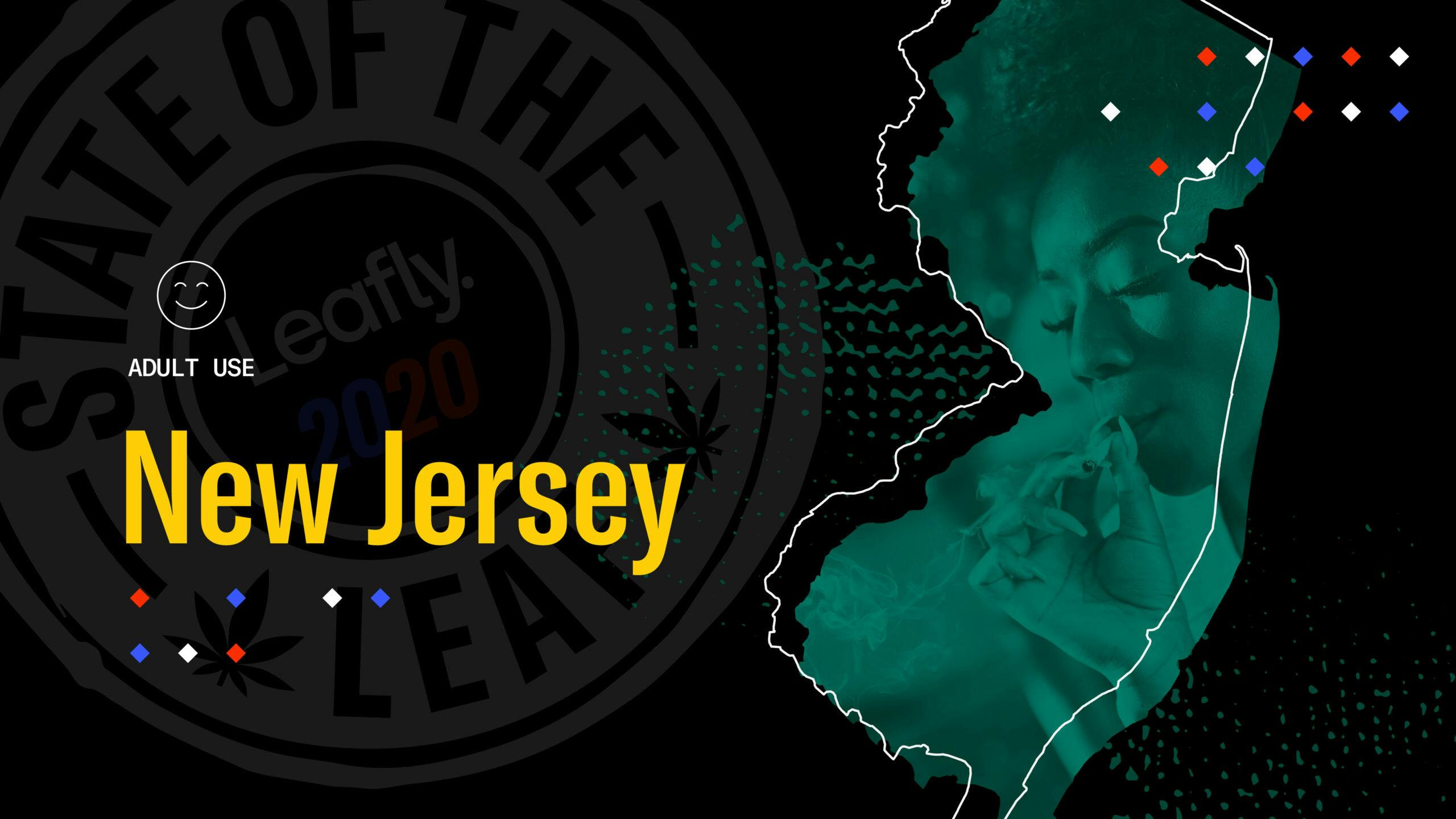Is weed legal in New Jersey?
Current legality status
recreational
Cannabis is legal under state law for adults 21+.
Marijuana is legal in New Jersey for recreational and medical use. Voters approved recreational use in the November 2020 election, and cannabis possession became legal for all adults 21 or older in New Jersey on February 22, 2021.
Commercial sales began on April 21, 2022.
Recreational customers can purchase up to one ounce of flower or its equivalent in other forms, and possess up to six ounces. Adults over the age of 21 can also gift another adult up to one ounce of cannabis.
Medical patients can currently purchase up to 3 ounces of cannabis in a 30-day period.
New Jersey recreational marijuana laws
New Jersey residents supported recreational marijuana in the November 2020 election by huge margins; the measure received two-thirds of the vote.
The New Jersey Marijuana Legalization Amendment (S2703/A4497), also referred to simply as Question 1 on the 2020 ballot, legalized the recreational use of marijuana for adults age 21 and older. It also legalized the cultivation, processing, and sale of retail cannabis.
Governor Phil Murphy (D) subsequently signed the New Jersey Cannabis Regulatory, Enforcement Assistance, and Marketplace Modernization Act (CREAMMA), a framework bill for the state program, on February 22, 2021.
Commercial sales began on April 21, 2022.
The sale of adult-use cannabis is subject to the existing state sales tax of 6.625%.
Local municipalities can require cannabis businesses to pay a 2% transfer tax, but that tax does not apply at the consumer’s point of sale.
About two-thirds of New Jersey municipalities opted out of allowing recreational sales. Yet state law permits delivery services to still operate in those parts of the state.
Recreational weed possession & use limits in NJ
Recreational customers can purchase up to one ounce of flower or its equivalent in other forms, and possess up to six ounces. Adults over the age of 21 can also gift another adult up to one ounce of cannabis.
New Jersey law considers possession of more than six ounces of cannabis a crime, subject to a maximum of 1.5 years in prison and a $25,000 fine.
Should I keep my medical marijuana card?
Now that recreational cannabis is legal in New Jersey, the state’s 120,000-odd medical patients may be wondering if they should hold on to their medical marijuana cards.
Patients should know that New Jersey is currently sunsetting its tax on medical marijuana. Until June 30, 2022, purchases will be taxed at 2%. After that date, medical marijuana will be fully exempt from sales taxes.
Patients pay $100 to renew their card every two years. If a patient spends about $65 on cannabis each month, it will cost them less to renew their card than to pay sales tax on recreational cannabis (once the medical marijuana sales tax fully sunsets in June 2022).
Does New Jersey have an expungement process in place?
On July 1, 2021, New Jersey’s concurrent decriminalization bill went into effect. It quickly resulted in the expungement of more than 362,000 cannabis-related cases.
Expungements have enabled more than 1,200 residents to be removed from probation.
Attention New Jersey residents: If you have a charge that you believe qualifies for expungement, file a motion for judicial review. Furthermore, it is possible that your case was expunged, but the state court system failed to contact you.
You can find instructions on getting your record expunged here.
New Jersey medical marijuana laws
In 2010, New Jersey governor Jon Corzine (D) signed the limited medical marijuana law SB 119 on his last day in office.
Weeks after Corzine signed the bill, incoming Gov. Chris Christie (R), a notorious marijuana prohibitionist, began a years-long campaign to stall, delay, slow-walk, and undermine the law.
Under Christie’s watch, New Jersey’s medical marijuana system remained one of the nation’s least effective, with extremely limited qualifying conditions and dispensary access. By 2016, there were only five licensed medical marijuana dispensaries serving a state of nearly 9 million people.
Progress came slowly to New Jersey. In 2015, the legislature allowed for the highly-regulated administration of medical marijuana on school grounds. In 2016, post-traumatic stress disorder (PTSD) was added to the list of qualifying conditions.
In 2017, New Jersey voters replaced Gov. Christie with Phil Murphy (D), who promised to expand the state’s medical marijuana program and push for full recreational legalization.
Gov. Murphy acted quickly. In March 2018, he signed an executive order that expanded medical marijuana access for patients and added five new qualifying conditions to the state’s list. Patient registration card became valid for two years. “The days of making residents jump through hoops are coming to an end,” Murphy said at the time.
In 2019, Murphy signed the Jake Honig Act which raised purchase and possession limits for patients, facilitated a gradual phasing-out of medical marijuana taxes by 2022, and made other long-needed reforms.
New Jersey qualifying conditions for medical marijuana
The CRC administers the state’s medical marijuana program. The state agency maintains a list of qualifying medical conditions for potential patients:
- Amyotrophic lateral sclerosis
- Anxiety
- Cancer
- Chronic Pain
- Dysmenorrhea
- Glaucoma
- Inflammatory bowel disease, including Crohn’s disease
- Intractable skeletal spasticity
- Migraine
- Multiple sclerosis
- Muscular dystrophy
- Opioid Use Disorder
- Positive status for Human Immunodeficiency Virus (HIV) and Acquired Deficiency Syndrome (AIDS)
- Post-Traumatic Stress Disorder (PTSD)
- Seizure disorder, including epilepsy
- Terminal illness with prognosis of less than 12 months to live
- Tourette Syndrome
For more information, visit the Cannabis Regulatory Commission website.
How to get a medical marijuana card in New Jersey
To get a medical cannabis card in New Jersey, individuals must first consult a doctor registered with the state’s medicinal marijuana program.
Don’t forget: Only physicians registered with the state program may recommend medical marijuana to patients. Your primary care doctor may or may not be registered.
Find a registered doctor here.
Individuals then work with their physician to ascertain if medical marijuana is appropriate for their condition. If so, the doctor will provide you with a reference number issued by NJ Health.
Next step: Go to NJ Health’s “How to Register” page. You will need:
● Your NJ Health medical marijuana reference number (given by your doctor)
● A passport-style photo taken within the last 60 days
● A government-issued photo ID, like a driver’s license
● Proof of New Jersey residency (can be a utility bill in your name, correspondence with the IRS, tax form like a 1099, etc)
● Payment: There is a registration fee of $100. Some patients may be eligible for a reduced fee of $20.
The application itself must be submitted via the NJ Health website. There is no in-person registration.
After NJ Health receives the application it can take weeks to process, and then potentially longer to receive your card in the mail.
A state-issued medical marijuana registry card is valid for two years from its issue date, but patients must check in with their certifying physician at least once every 12 months.
Patients may not possess marijuana obtained from a source other than a New Jersey state-licensed medical cannabis dispensary.
Does New Jersey accept out-of-state MMJ cards?
Yes, but it’s complicated.
New Jersey law does allow certain leeway for out-of-state patients to possess and even purchase medical cannabis. In 2019, lawmakers passed legislation to provide additional rights for out-of-state medical marijuana users. But follow the rules carefully: Patients from another state can still find themselves arrested for marijuana possession.
● Individuals registered as patients under their states’ medical marijuana programs can receive reciprocity, or otherwise be considered to be qualifying patients, under New Jersey’s medical marijuana program for up to six months while they are visiting the state.
● During those six months, they are allowed to consume and possess medical marijuana in an amount that complies with New Jersey’s medical marijuana program and also complies with the limitations specified by the medical marijuana laws of that person’s home state.
● Visitors with a valid out-of-state medical marijuana card can also purchase medical marijuana from licensed dispensaries in New Jersey if they have received authorization from a New Jersey medical practitioner based on a medical condition that qualifies under New Jersey’s program.
When does my New Jersey medical card expire?
A NJ Health-issued medical marijuana registry card is valid for two years from its issue date.
New Jersey cannabis homegrow laws
Growing your own weed is illegal in New Jersey, even for medical patients.
New Jersey public consumption laws
New Jersey will permit indoor and outdoor consumption lounges for both medical patients and adult-use customers. Otherwise, virtually all public consumption is prohibited.
New Jersey cannabis DUI laws
It is unlawful for a person to drive under the influence of any drug or alcohol in all states. However, a registered medical marijuana patient is not considered under the influence solely for having cannabis metabolites in their system.
The penalties for intoxicated driving on any substance in New Jersey vary according to an offender’s DUI history. First-time offenses typically result in a $250 to $400 fine, and a jail sentence of up to 30 days with a suspended license. For repeat offenders, the penalties ratchet up.
| Marijuana DUI | Imprisonment | Max Fine |
| First offense | Up to 30 days | Up to $400 |
| Second offense | Up to 90 days | Up to $1,000 |
| Third offense | Up to 6 months plus loss of license | Up to $1,000 |
New Jersey cannabis testing regulations
The CRC adopted temporary testing regulations in August 2021 as part of a larger set of regulations; the package expires in August 2022. The regulations are largely straightforward, and require labs to test for cannabinoid content, heavy metals, pesticides, and more.
On December 15, 2021, the CRC began accepting applications from testing labs to participate in the adult-use market. As of this writing, they have not awarded any licenses. Third-party labs already test medical marijuana in New Jersey.
Common questions about marijuana in New Jersey
Does New Jersey have recreational or decriminalized cannabis?
Wondering if weed is legal in NJ? New Jersey legalized recreational marijuana use in Nov. 2020 with the New Jersey Marijuana Legalization Amendment (S2703/A4497). It is now legal for both medical patients and adults 21 and older to possess cannabis. Medical marijuana is sold in licensed dispensaries. Recreational marijuana stores are expected to open in April or May 2022.
Can New Jersey residents grow their own cannabis?
No, not even medical patients are able to grow cannabis.
How much cannabis can a patient legally possess in New Jersey?
All adults 21 and older possess up to 6 ounces of cannabis.
How many recreational dispensaries are in New Jersey?
13 dispensaries currently serve recreational customers. Five more will open by mid-August of 2022.
What types of cannabis products are legal for medical and recreational use in New Jersey?
New Jersey law allows state-licensed dispensaries to sell cannabis flower, vape cartridges, extracted oil, lozenges, and topicals.
Can you get a medical card in New Jersey if you have a felony?
A felony conviction will not prevent someone from getting a medical cannabis card in New Jersey.
What are the New Jersey medical program’s qualifying conditions?
- Amyotrophic lateral sclerosis
- Anxiety
- Cancer
- Chronic Pain
- Dysmenorrhea
- Glaucoma
- Inflammatory bowel disease, including Crohn’s disease
- Intractable skeletal spasticity
- Migraine
- Multiple sclerosis
- Muscular dystrophy
- Opioid Use Disorder
- Positive status for Human Immunodeficiency Virus (HIV) and Acquired Deficiency Syndrome (AIDS)
- Post-Traumatic Stress Disorder (PTSD)
- Seizure disorder, including epilepsy
- Terminal illness with prognosis of less than 12 months to live
- Tourette Syndrome
This page was last updated on May 25, 2022.
Learn more about marijuana legalization in New Jersey
Keep up with the latest news about legalization in New Jersey
You’ll want to keep current on New Jersey’s fast-changing laws by bookmarking Leafly politics and signing up for our newsletter.
Post last updated Nov. 4, 2020
By providing us with your email address, you agree to Leafly's Terms of Service and Privacy Policy.


